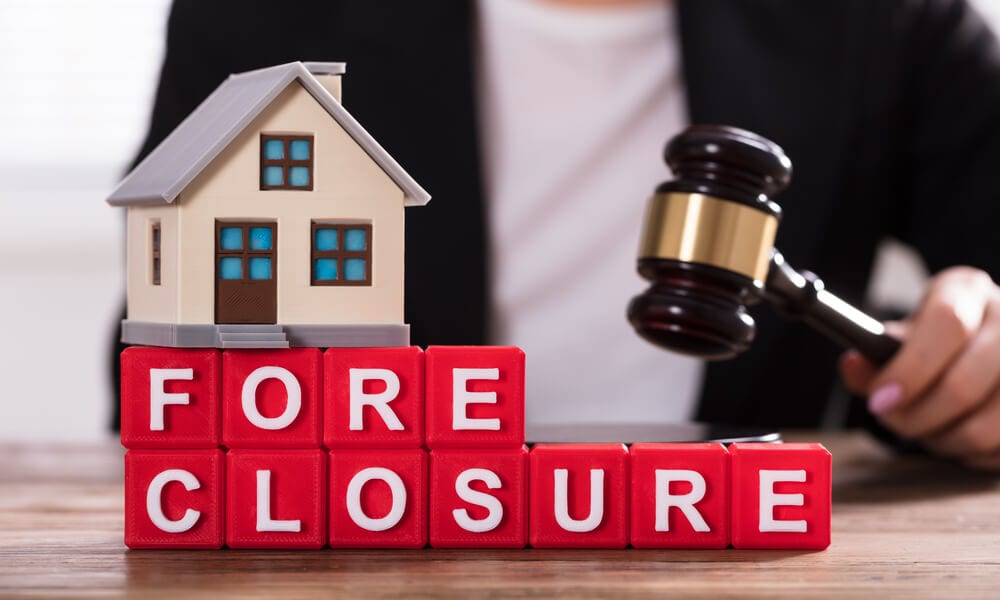Foreclosure is the legal process by which a lender seeks to recover the amount owed on a defaulted loan by seizing and selling the mortgaged property. Default is typically triggered when a borrower fails to make a certain number of monthly payments, but it can also occur when the borrower fails to meet other terms in the mortgage document.
The foreclosure process varies by state, but in general, lenders work with borrowers to catch up on payments and avoid foreclosure.
The most recent national average for the foreclosure process is 857 days; however, the timeline varies greatly by state.
Understanding Foreclosure
The foreclosure process is legally supported by a mortgage or deed of trust contract, which grants the lender the right to use a property as collateral if the borrower fails to comply with the terms of the mortgage. The foreclosure process generally begins when a borrower defaults or misses at least one mortgage payment, though this varies by state. The lender then sends a missed-payment notice, indicating that the payment for that month has not been received.
If the borrower fails to make two payments, the lender will send a demand letter. This is more serious than a missed payment notice, but the lender may still be willing to work with the borrower to make up the missed payments.
After 90 days of missed payments, the lender sends a default notice. The loan is transferred to the lender’s foreclosure department, and the borrower is usually given another 30 days to settle the payments and reinstate the loan (this is called the reinstatement period). If the homeowner has not made up the missed payments by the end of the reinstatement period, the lender will begin foreclosure proceedings.
The Foreclosure Procedure Differs by State
Each state has its own foreclosure laws, which govern everything from the notices that a lender must post publicly to the homeowner’s options for bringing the loan current and avoiding foreclosure to the timeline and process for selling the property.
A foreclosure—the actual act of a lender seizing a property—is usually the last step after a lengthy pre-foreclosure process. Before foreclosure, the lender may offer several alternatives to avoid foreclosure, many of which can mediate a foreclosure’s negative consequences for both the buyer and the seller.

How Long Does It Take to Foreclose?
According to the U.S. Foreclosure Market Report from ATTOM Data Solutions, a property data provider, properties foreclosed in the second quarter of 2021 spent an average of 922 days in the foreclosure process. This is a slight decrease from the previous quarter’s average of 930 days, but an increase of 34.5% from 685 days in the second quarter of 2020.
Because of differences in laws and foreclosure timelines, the average number of days varies by state.
Is it possible to avoid foreclosure?
Even if a borrower has missed one or two payments, there may be ways to avoid foreclosure. Among the alternatives are:
Reinstatement: During the reinstatement period, the borrower can pay back what they owe (including missed payments, interest, and any penalties) before a certain date in order to get back on track with their mortgage.
Short refinance: A short refinance occurs when the new loan amount is less than the existing balance, and the lender may forgive the difference to assist the borrower in avoiding foreclosure.
Special forbearance: If the borrower is experiencing a temporary financial hardship, such as medical bills or a decrease in income, the lender may agree to reduce or suspend payments for a specified period of time.
Foreclosure’s Consequences
If a property fails to sell at a foreclosure auction, or if it never went through one, lenders—often banks—typically take ownership and may add it to a portfolio of foreclosed properties, also known as real estate owned (REO).
Bank websites typically make for easy access to foreclosed properties. Such properties can be appealing to real estate investors because banks sometimes sell them at a discount to their market value, which hurts the lender.
A foreclosure appears on a borrower’s credit report within a month or two, and it remains there for seven years from the date of the first missed payment. The foreclosure is removed from the borrower’s credit report after seven years.




